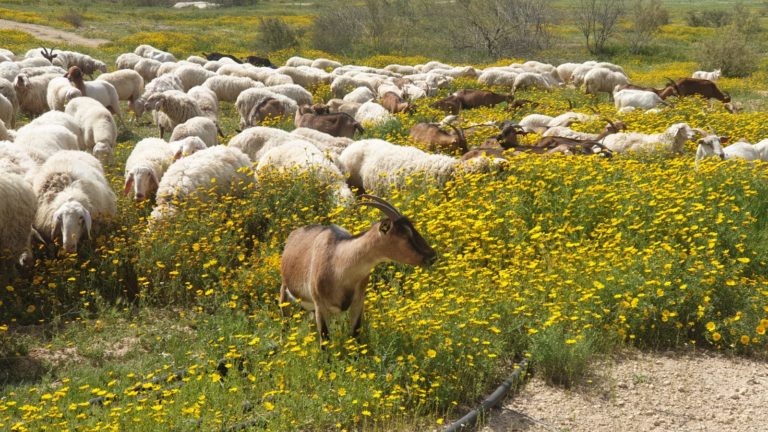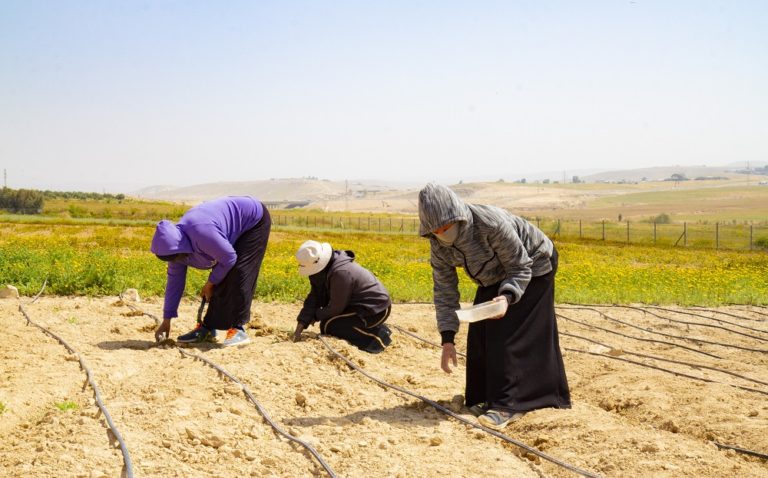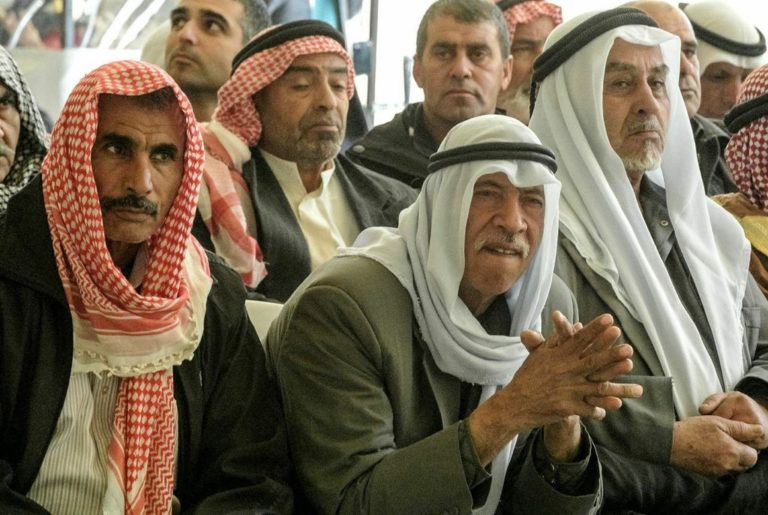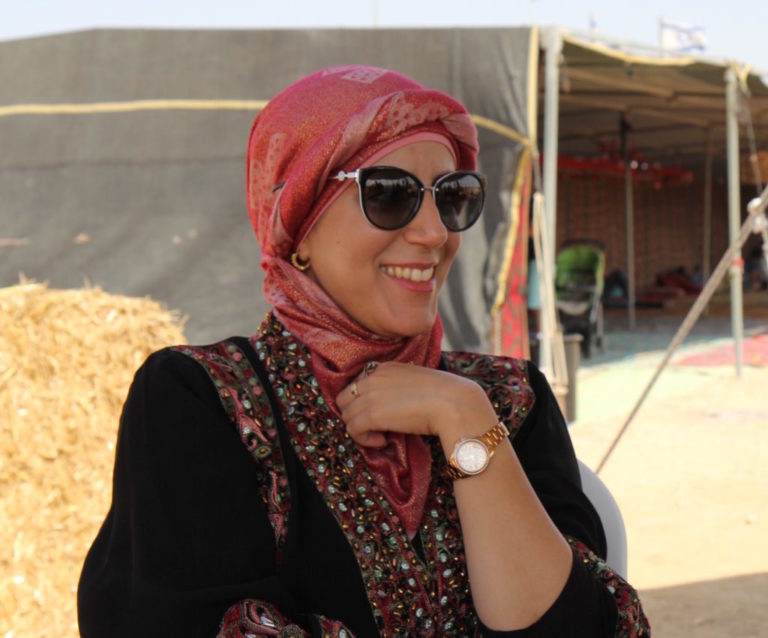Project Wadi Attir, the flagship initiative of The Sustainability Laboratory with a Bedouin community in the Negev, is a model for hope and positive change, empowering the Bedouin community while showcasing a transformative approach to sustainable development. We recently spoke with Lina Alatawna, CEO of Project Wadi Attir and a young woman from the Bedouin community, about how the project has grown over the years, her vision for the future, and more. We hope you enjoy this recent interview with Lina.

The Lab: What changes have you seen at Project Wadi Attir, personally and project-wide, over the years?
Lina: Everything is different now, in a good way! Even me. Comparing myself when I began working at Project Wadi Attir to myself now, I’m totally not the same person. I notice these changes with the other staff as well. We have all changed significantly throughout our time at Project Wadi Attir.
Personally, I have taken many huge steps. For example, now I feel that I am so much more patient with the employees, and with people in general. Before, I wanted things to go faster, and sometimes got frustrated if things didn’t go the right way. Now I can take a deep breath and think more clearly about the situation, and evaluate it in a better way to make the right decision. I can handle all sorts of high-pressure situations. If something goes wrong in the project, I can stop and think, and help make everybody calmer. These kinds of skills I didn’t have before. I feel more confident, calmer in a good way, and better able to see things clearly and make the right decisions. I’m so grateful to Project Wadi Attir. For me it has been huge, and also for the other people in the project.
More broadly, when I came to Project Wadi Attir in 2016, we just had two or three products in the dairy. Now we have many products from the different departments. It was as if we had created something from nothing. The project, just a few years ago, before all of the construction and everything, was just a desert. Now it’s like a paradise, something that nobody could have imagined, that we created this thing in just a few years.

The Lab: How have Project Wadi Attir and The Sustainability Laboratory have broadened your understanding of sustainability?
Lina: When I came to Project Wadi Attir, I had many thoughts and ideas about each of the elements that the project was working on, but I didn’t have a full and clear understanding of sustainability. Now I deeply understand The Sustainability Laboratory’s approach to sustainability, and five core sustainability principles developed by Michael Ben-Eli, which have been driving the development of Project Wadi Attir. It’s almost philosophical! When you’re inside the project, when you see everything in the project come together, all the five dimensions—everything works together harmoniously. The herds, dairy, green technologies, medicinal plants, indigenous vegetables, tourism, education, community outreach, and more… It makes you realize that the approach makes sense, it’s organized, it’s how it’s supposed to be. Everything that we do at Project Wadi Attir relates to the five dimensions of sustainability. Before I came to the project I never thought about sustainability in this way, and now I realize that it’s huge, and that it’s more important than I thought it was.

The Lab: What is your vision for the future of Project Wadi Attir?
Lina: My vision is to see Project Wadi Attir completing all of its ongoing goals, such as finishing the integrated infrastructure of green technologies, and reaching financial self-sufficiency. There will always be more goals and more targets that we need to reach, but in the long-term I would like to see Project Wadi Attir copied in different desert areas in the world, replicated with other communities. To show the whole world that a small society—any small community, like the Bedouin community, that has its own traditional knowledge and own values—given the chance can do incredible things. These communities have knowledge to teach and share with others. I would like to see the knowledge generated at Project Wadi Attir serving many communities around the world, not just the Bedouin community and not just in Israel.

The Lab: Tell us about some of the social innovations of Project Wadi Attir.
Lina: People at Project Wadi Attir respect each other and accept each other. About 10 different Bedouin tribes are represented at the project. Even when project staff are from different tribes, these differences between tribes don’t matter in the project. We are all the same. If there is a fight between two tribes, and two people from those tribes work at the project, we don’t have a fight inside the project. The staff understand that they can’t bring it inside the project. That’s a big achievement. I tell every group visiting the project that this is one of our big successes at Project Wadi Attir, that about 30 people from more than 10 different tribes work together for the same goals, and the same vision. This is not common at all, not just in the Bedouin community, but I think in the Arab community in general. We all work as one team.

I also see developments related to gender equality at Project Wadi Attir. For example, we have one staff member, a Bedouin woman, who works in housekeeping. When she first came to the project, she didn’t talk to anyone. She just dressed in black. She was so shy. I think this wasn’t because she was new on our team. She didn’t know what she was supposed to do, or what to expect from the people around. And today she’s talking and laughing. She feels free to tell us about herself—even with the guys, not just with the women at the project. Which is also not common at all in the Bedouin community. Every day, we all sit together, all staff from every department, for lunch. All the employees—men and women. Which is, again, not common in the Bedouin community at all. Personally, I see this as a big success of the project.

The Lab: Finally, do you have any advice for Bedouin girls and women who may hope to one day become leaders in the community?
Lina: The most important thing is to believe in themselves. When they want something, when they aim to get something, they can do it. And nothing is impossible to reach. They just need to dig in and they can reach it. Bedouin girls have so much ability and potential. But unfortunately, not all Bedouin girls believe in themselves, so they don’t even know the power that they have. And they don’t know how much they can impact their community in a positive way.

Lina is from the Bedouin township of Hura and holds a Master’s degree in Industrial Engineering and Management from Shamoon College of Engineering. She came to Project Wadi Attir in 2016 as the manager of the dairy, and was appointed to CEO two years later, at only 28 years old, in a groundbreaking example of female achievement in the Bedouin community. Her leadership has helped guide the development of the project, and through the hardships of the COVID-19 pandemic.
Showing